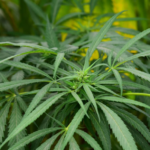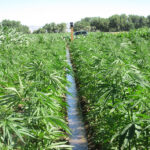The town of Nipton, California, is on the verge of a population boom. This former ghost town, which was founded in 1905 and sits near the Nevada border, was recently purchased by American Green, Inc., an Arizona-based marijuana technology company. American Green intends to make Nipton America’s “first energyindependent, cannabis-friendly hospitality destination.” Offering products ranging from cannabis-infused water to marijuana edibles, the new owners hope to make this sleepy hamlet on the edge of the Mohave Desert a destination hotspot for marijuana enthusiasts.
 But to make this dream a reality, American Green is going to need ingenuity, manpower, and water. Lots and lots of water. You cannot grow marijuana and hemp without it. The transformation of Nipton, California, into Marijuanaville, USA, provides the perfect backdrop for examining the complexities of federal and state marijuana and hemp laws and how those who facilitate the cultivation of these highly sought-after crops may find themselves on the wrong side of the law.
But to make this dream a reality, American Green is going to need ingenuity, manpower, and water. Lots and lots of water. You cannot grow marijuana and hemp without it. The transformation of Nipton, California, into Marijuanaville, USA, provides the perfect backdrop for examining the complexities of federal and state marijuana and hemp laws and how those who facilitate the cultivation of these highly sought-after crops may find themselves on the wrong side of the law.
Let us start with the basics. Twenty-nine states, the District of Columbia, Guam, and Puerto Rico have enacted some form of marijuana legalization or, more accurately, decriminalization laws. A handful of states have legalized marijuana for recreational use, and others for medicinal use. Thirty-three states have adopted industrial hemp statutes of varying types and for a range of purposes. Seventeen states have enacted so-called therapeutic hemp laws to allow the cultivation of “low THC [tetrahydrocannabinol], high cannabidiol (CBD)” products for medical reasons in limited situations or as a legal defense.
Nonetheless, it is illegal to grow marijuana and hemp (except under certain, limited circumstances), anywhere in the United States, even in states that have legalized it. That is because federal law, specifically the Controlled Substances Act (CSA), prohibits the manufacture, distribution, dispensation, or possession of marijuana for any purpose. The CSA classifies marijuana as a Schedule I drug, which means it has been deemed to have a high potential for abuse, no currently accepted medical use in treatment, and a lack of accepted safety for use under medical supervision. The statute broadly defines marijuana to include any variety of the plant Cannabis sativa L., including lower-THC-producing hemp plants.
In enacting the CSA, Congress made several findings regarding the breadth and scope of the law, namely: “Controlled substances manufactured and distributed intrastate cannot be differentiated from controlled substances manufactured and distributed interstate. Thus, it is not feasible to distinguish, in terms of controls, between controlled substances manufactured and distributed interstate and controlled substances manufactured and distributed intrastate. . . . Federal control of the intrastate incidents of the traffic in controlled substances is essential to the effective control of the interstate incidents of such traffic.”
The Supreme Court in 2005 affirmed Congress’s authority to regulate (meaning, prohibit) marijuana cultivation and distribution, even when it is wholly intrastate and done pursuant to state law. So, until the Supreme Court reverses its ruling on Congress’s plenary commerce power (which is unlikely) or Congress itself removes marijuana from Schedule I, marijuana and hemp production will continue to be prohibited by the CSA.
Congress has yet to vote to decriminalize marijuana. Instead, it has, for the last several years, instructed the U.S. Department of Justice and its agencies to not use funds “to prevent any of [the enumerated States] from implementing their own laws that authorize the use, distribution, possession, or cultivation of medical marijuana [emphasis added].” What does that mean? Good question.
The Justice Department arguably cannot prevent a state from implementing its medical marijuana laws, say by bringing a civil action against the state to have the state’s law declared preempted by the CSA. But can it still use its resources to enforce federal law in a manner that does not impede state implementation? In 2016, the Ninth Circuit split the difference. It ruled that funds used to investigate and prosecute medical marijuana operations in California and Washington violated the funding restriction. However, the government was not prohibited from taking legal action against those “who do not strictly comply with all state-law conditions regarding the use, distribution, possession, and cultivation of medical marijuana” because they would “have engaged in conduct that is unauthorized.”
Therefore, marijuana grown for medicinal purposes in strict adherence to state law cannot be prosecuted under the CSA (for now, anyway). Any other marijuana, including marijuana sold under a state’s recreational law, is fair game.
Congress has also muddied the waters with regard to industrial hemp, which continues to be prohibited by the CSA. Congress has yet to amend that statute to decriminalize hemp, although several bills pending before Congress propose to do that. Instead, as part of the 2014 Farm Bill, Congress exempted industrial hemp (hemp with a THC level of 0.3 percent dry weight basis) from the CSA if it is cultivated pursuant to state law for research purposes by a state agricultural department or institution of higher education.
 What do all of these laws mean for those in the business of delivering water? In 2014, the Bureau of Reclamation issued a policy that, if possible, is even murkier than Congress’s actions on the subject. The policy says that Reclamation will not approve the use of Reclamation facilities or contract water in the cultivation of marijuana and will report such use to the Justice Department. This goes without saying, considering that federal agencies must comply with federal law. Oddly, the policy makes no accommodation for industrial hemp cultivation that conforms to the Farm Bill. Just the opposite. By relying on the CSA’s definition of marijuana, it arguably includes in its policy hemp in any form grown for any purpose.
What do all of these laws mean for those in the business of delivering water? In 2014, the Bureau of Reclamation issued a policy that, if possible, is even murkier than Congress’s actions on the subject. The policy says that Reclamation will not approve the use of Reclamation facilities or contract water in the cultivation of marijuana and will report such use to the Justice Department. This goes without saying, considering that federal agencies must comply with federal law. Oddly, the policy makes no accommodation for industrial hemp cultivation that conforms to the Farm Bill. Just the opposite. By relying on the CSA’s definition of marijuana, it arguably includes in its policy hemp in any form grown for any purpose.
Reclamation goes on to say that the policy does not apply to noncontract water commingled with contract water in a nonfederal facility. Those in the water delivery business should not read the Reclamation policy as sanctioning water delivery to marijuana cultivation so long as it is nonfederal water or does not pass through a federal facility (which is also open for interpretation).
If water delivery rises to the level of aiding and abetting the manufacture of a controlled substance, the law does not care where the water came from. The Reclamation policy may have actually done more harm than good in this regard. If, in an effort to comply with the policy, irrigation districts are intentionally manipulating their water delivery so that only certain types of water are provided to marijuana or unsanctioned hemp farms, it could actually increase their exposure to liability. As the Ninth Circuit’s jury instruction on aiding and abetting makes clear, “[t]he intent requirement [of aiding and abetting] is satisfied when a person actively participates in a criminal venture with advance knowledge of the circumstances constituting the elements of the charged offense.”
Does knowingly delivering water to a marijuana farm for profit constitute aiding and abetting? It just might. It may also trigger the CSA’s prohibition on maintaining drug-involved premises and the federal money laundering statute, both of which expose offenders to criminal and civil penalties and asset forfeiture.
It is unlikely that irrigation districts are at the top of the list of targets for criminal prosecution by the Justice Department. And, at least for now, the department cannot pursue prosecutions against state-compliant medical marijuana or Farm Bill–compliant hemp cultivation. But knowingly facilitating unlawful activity on the assumption that you will not be prosecuted probably is not the best way to run a business.
Caroline Lynch is the founder and owner of Copper Hill Strategies LLC. Ms. Lynch has 15 years of Capitol Hill experience, including a decade with the House Judiciary Committee. You can reach Ms. Lynch at caroline@copperhillstrategies.com.



